On the evening of Thursday February 24th, suitcases in hand, MJ and I headed down to the San Francisco airport for a quick flight down to Los Angeles for the Southern California Linux Expo. We arrived at LAX just after midnight and were checked into our hotel room by 1AM. I went right to sleep so I’d be reasonably well-rested for my 9AM talk the following morning.
Bright and early on Friday morning we got up and headed downstairs to the conference. I saw lots of familiar faces when I walked into the Ubucon room and finally had the opportunity to meet Ubucon organizer Nathan Haines and fellow Ubuntu California team leader David Wonderly.
First up for Ubucon was my talk on Finding Help in Ubuntu! The talk went well and I was delighted by the amount of audience participation so early in the morning. I have posted the slides here:
The next full presentation I went to was Jack Deslippe’s Developing Your First Ubuntu App with Quickly. Quickly is a pretty cool framework that brings together several tools for quick deployment of Python apps, and every time I see a talk about it I want to hit the books again to learn Python and write… something. For lunch a bunch of us Ubuntu California types headed over to the burger place across the street from the hotel. After lunch I went to Dru Lavigne’s Confessions of a Community Manager which gave a lot of basic guidelines for community managers within projects. The current popularity of community managers within open source projects is something that caught me somewhat by surprise and I’ve mostly worked in projects which were either too small to require such a role or otherwise really didn’t have a place for it and mostly thought Ubuntu an exception because Ubuntu it’s quite large. From there I spent the break at the Ubucon Q&A and then went down for the popular This is why you FAIL talk, which certainly was entertaining and hit a lot of the pain points I’ve seen in some projects. It was then back to Ubucon for Ted Gould’s Contributing to Unity presentation. The evening itself wrapped up with UpSCALE, an entertaining series of lightning talks. I have to admit being pretty exhausted at this point, so MJ and I grabbed some take-out at the hotel’s 24-hour cafe and headed up to our room.
Saturday! It was the first day of the expo booths so by 9AM I was downstairs delivering fliers to the Partimus booth and a whole suitcase of goodies for the Ubuntu booth. Before the expo opened we even got a quick shot of the Partimus booth:
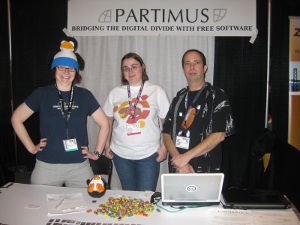
The booth was staffed by Beth Lynn for most of the day on Saturday and Mark was able to take over on Sunday, my contributions to the booth amounted to a coffee run and infrequent staffing as needed.
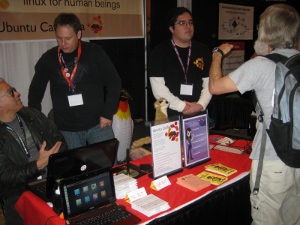
Fortunately the first talk of the day wasn’t until 10AM – ah conferences catered to geeks! It was the first keynote of the conference, Hackerspaces and Free Software by Leigh Honeywell. Leigh is an excellent speaker and her excitement and passion for hackerspaces is infectious. From there I headed back downstairs to spend an hour at the Ubuntu booth. At 12:30 several of us met up for an Ubuntu Women lunch.
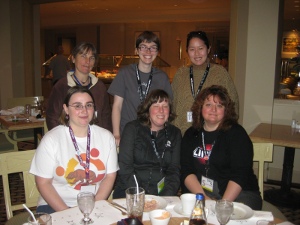
After lunch the plan was to attend the talk by Owen DeLong of Hurricane Electric on IPv6 Basics for Linux Administrators, but I wasn’t the only one who wanted to attend. The talk was standing room only and overflowing into the hallway. Seeing as my interest was primarily academic (I already am using IPv6 on one VM and sadly the datacenter we inhabit at work still doesn’t have an ETA on IPv6 deployment) I decided not to attempt to push my way in and MJ and I took the opportunity to explore the expo floor and take another shift at the Ubuntu booth. At 4:30 it was off to Securing web applications for system administrators. I have to admit that in my day to day work I don’t have to deal with a lot of “random insecure webapps installed everywhere” that many service providers have to, and I’m thankful for that. The talk covered a lot of the basic security precautions (mod_security, snort as intrusion prevention) but reminded me that I have to expand my toolset since there are always places we can make improvements should I be in a position to support such an environment in the future. I wrapped up the talk day by going to Behind the Scenes of Google Project Hosting. It was interesting seeing the thought process involved in their offerings but I have to admit that I’ll probably always use launchpad for projects because of the integration with Ubuntu and use of bzr (Google Code still just offers Mercurial and svn, they had no comment when pressed for the possibility of git support).
Sunday morning I headed down to that day’s keynote by Canonical CEO Jane Silber, Cloud for Human Beings. She’s a good speaker but the talk itself was completely review for me since I’m already familiar with the Ubuntu cloud options and the technologies behind Open Stack. From the keynote I headed to Mark Burgess’ The Future of Open Source Configuration Management. I had my reservations about attending this one (almost went to Bond, Ethernet Bond) because I’ve gone to a couple of pretty mediocre configuration management talks in the past year and have been continually unimpressed with the current centralized configuration management options for the needs of a small company like the one I work for – we have enough servers that a management system beyond shipped files in a Debian package may be nice, but too much variation for current tools to be worth the time (no two webservers I manage look the same!). Plus, the talk seemed to be on the academic side, and I’ll be the first to admit that I’m quick to tire of academics when I want to get something done. End result? I’m delighted that I went. While no technical solutions were concretely put forward, the presentation was excellent (not just because it has dinosaurs and other earth and biology science references) and it brought to the forefront the discussion I’d been seeking but hadn’t been having yet regarding current problems with systems of configuration management. It was one of my favorite talks of the weekend.
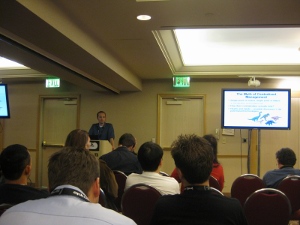
Lunch was brought to me by MJ as I manned the Ubuntu booth and did a quick interview about the booth for a friendly guy with a camera. The booth had been busy all weekend and we certainly weren’t seeing a slowdown. At 1:30 I headed back upstairs to see Ted Gould’s Unity: Why does it matter? So, why all these Unity talks? The only place I use Gnome is on my netbook because I don’t require a lot of flexibility in the UI and it has the indicators I want behaving properly, my desktop has XFCE and the 2 Debian boxes (one is an old laptop, another is my firewall + 2nd desktop) run fluxbox. For me, Gnome is either not flexible enough to do what I want with ease (can I have 3 clocks with different timezones in my panel? XFCE says “sure!”) or way too overboard for my basic window drawing needs (the fluxbox systems). So, if Gnome isn’t configurable enough for me, what is Unity? Really, really not configurable enough for me, I probably will even stick to Gnome classic on my netbook once I convince myself to upgrade it beyond 8.04 ;) So why, why do I care about Unity? Because it will be the default in 11.04 and I think I’d miss a good opportunity if I avoided learning about it. This Unity talk was particularly interesting because of the extensive Q&A session where Ted fielded some great, tough questions from the audience about usability choices and behavior. Kudos to the audience for the grilling, and to Ted for handling it all with such grace.
From there it was downstairs for my last shift at the Ubuntu booth and then expo breakdown at 4PM. The last talk MJ and I attended was CEPH: Petabyte Scale Storage for Large- and Small-scale Deployments and then it was time to head toward the airport.
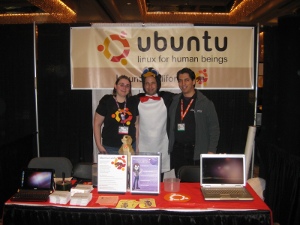
More of my photos from the conference are in a couple sets on flickr:
http://www.flickr.com/photos/pleia2/sets/72157626044725255/
http://www.flickr.com/photos/ubuntu-us-ca/sets/72157626169907536/
In all it was a really excellent conference and as always it was a delight to meet a number of people who I’d only previously communicated with online. The only downside of the whole thing was something we brought home with us: a horrible flu. MJ came down with symptoms first, I was bedridden by Thursday, the fever came and went for 3 days. Today is the first day I’m close to feeling normal again, but the cough and fatigue are lingering. SCaLE good, SCaLE flu bad!

